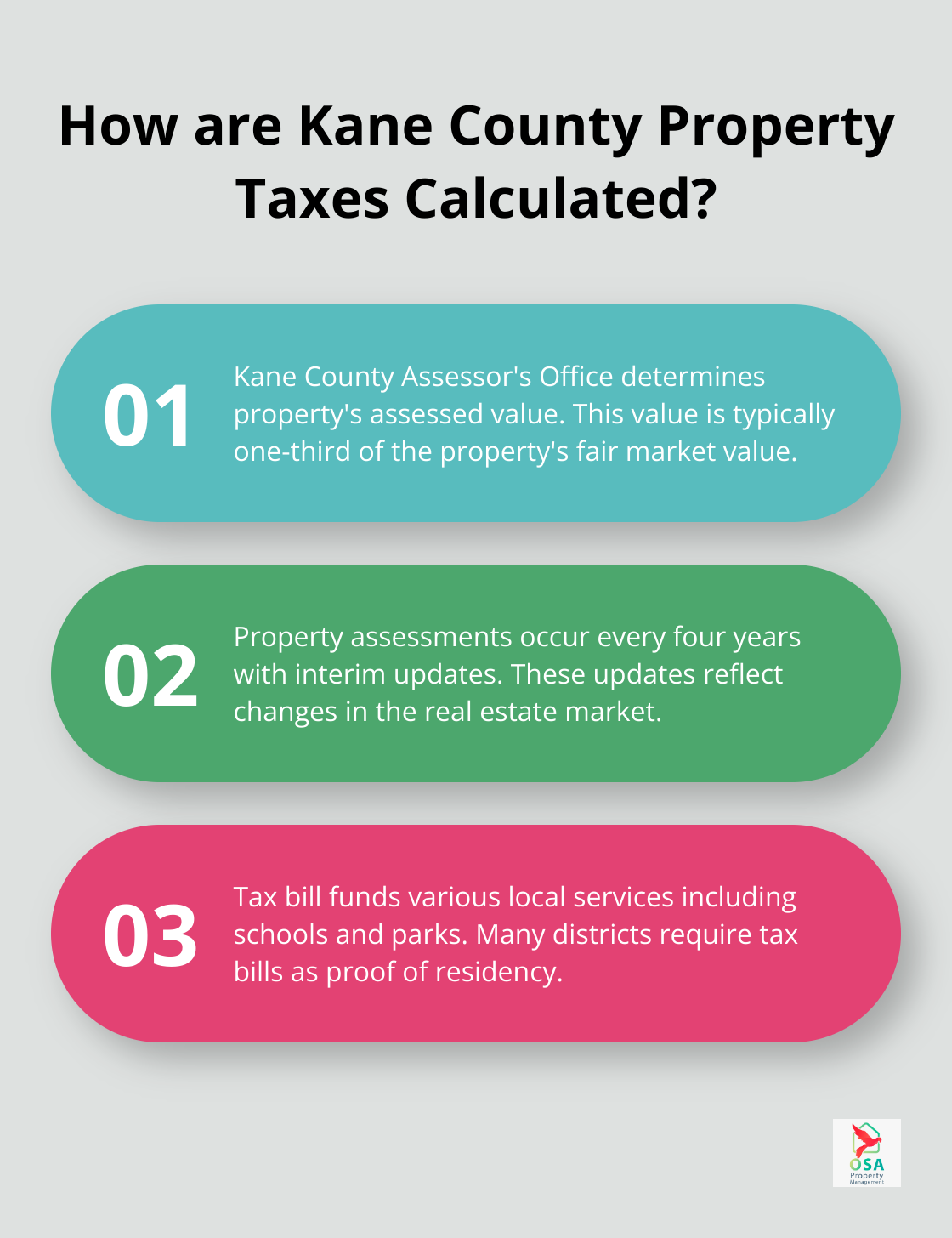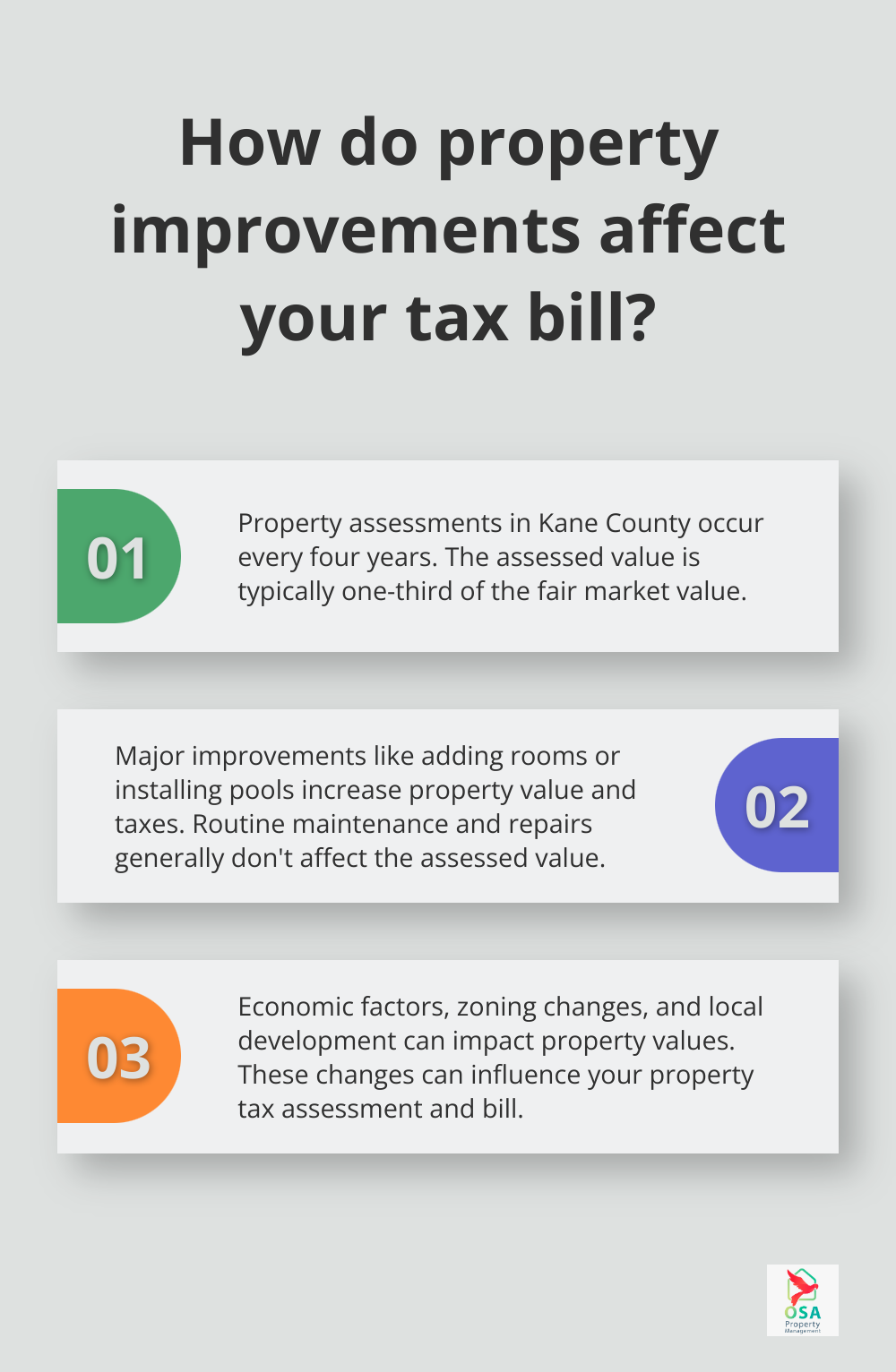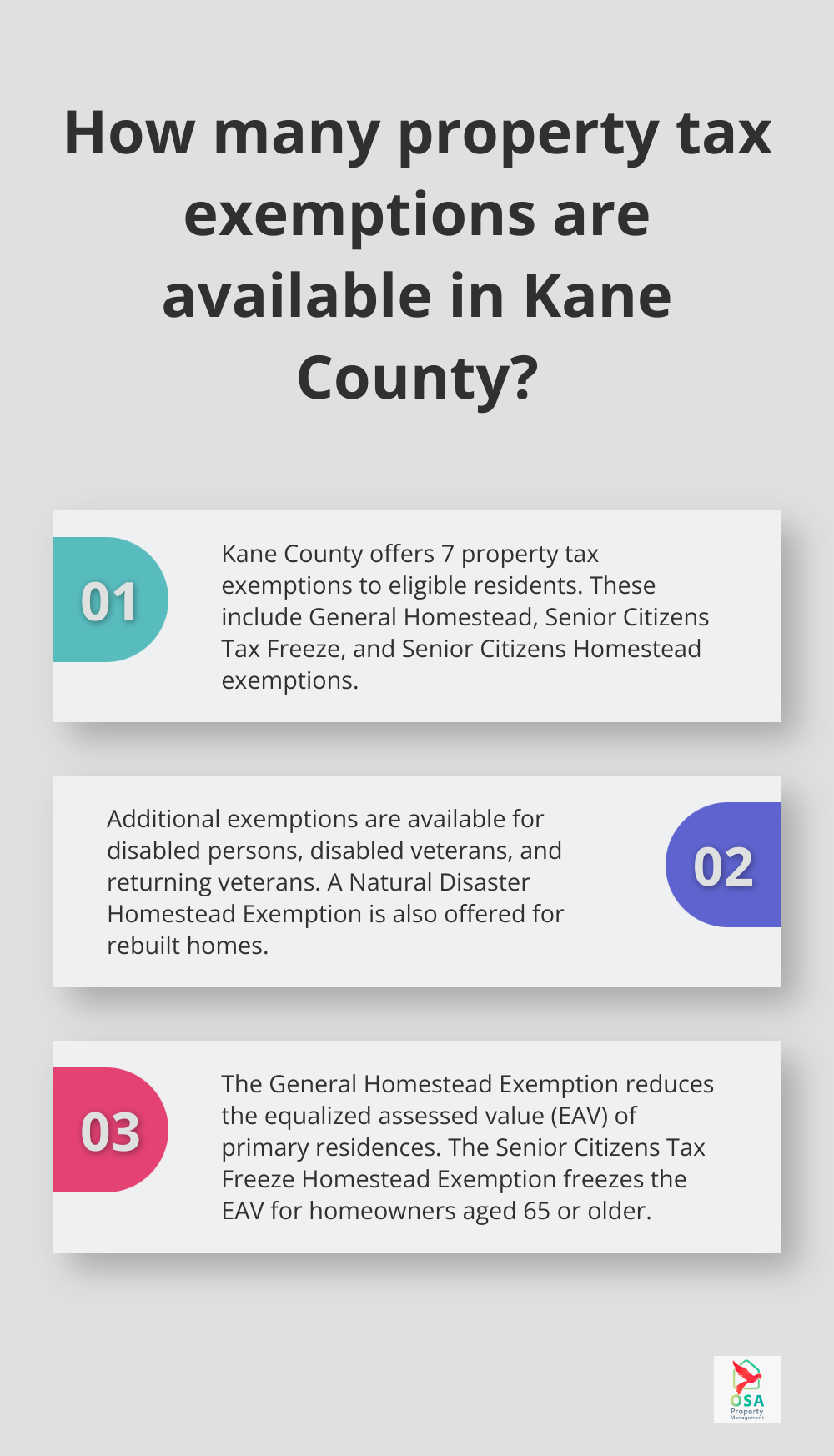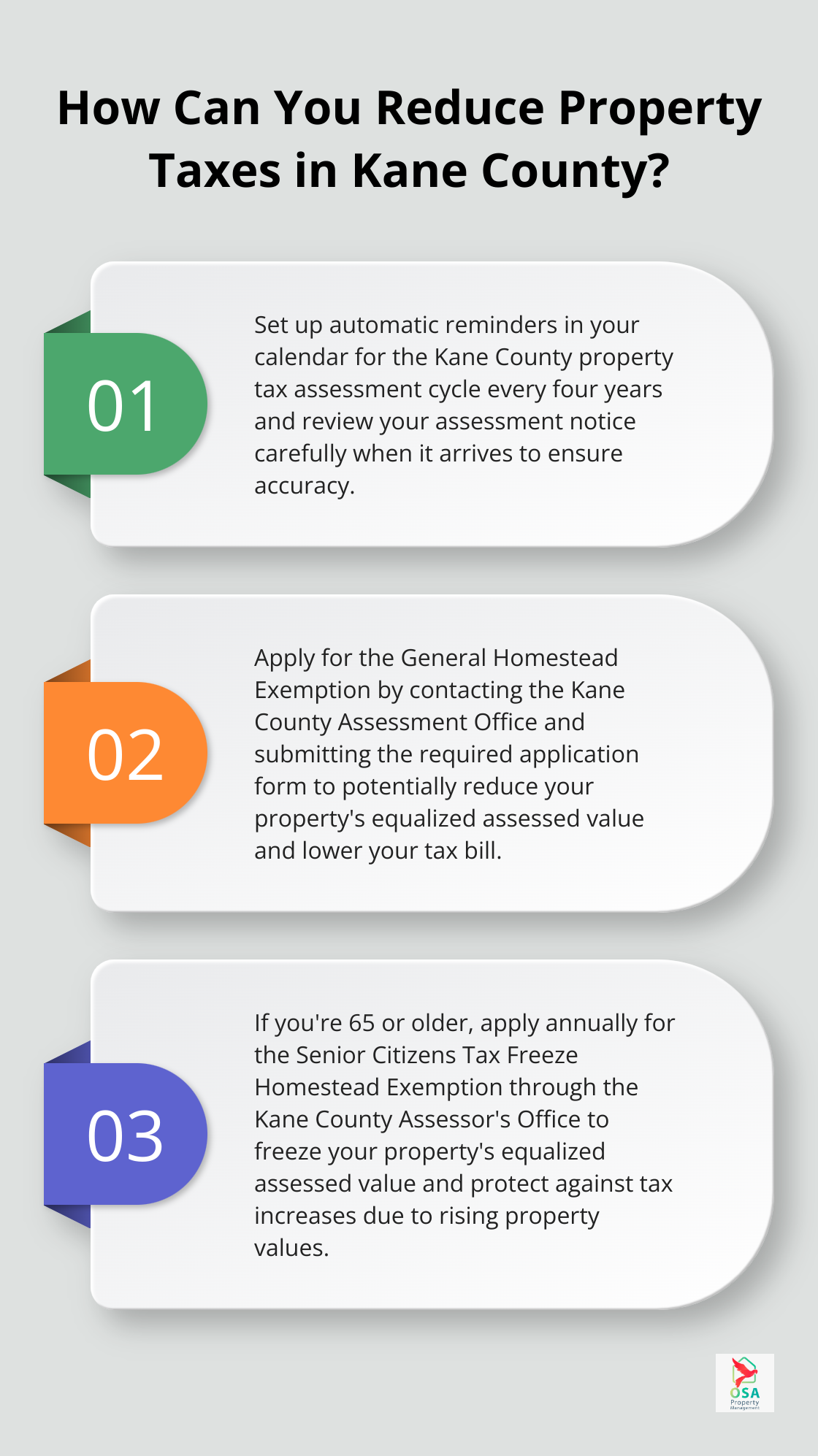At Osa Property Management, we understand the importance of staying informed about local property taxes. As we enter 2024, Kane County property taxes are a hot topic for homeowners and investors alike.
This guide will break down the key aspects of Kane County property taxes for 2024, including calculation methods, assessment factors, and available exemptions. We’ll also highlight recent changes that may affect your tax bill this year.
How Are Kane County Property Taxes Calculated?
Understanding the Assessment Process
Kane County property taxes are a complex aspect of homeownership. The Kane County Assessor’s Office determines your property’s assessed value, which is typically about one-third of its fair market value. This assessment occurs every four years, with updates in between to reflect changes in the real estate market.
Breaking Down Tax Components
Your property tax bill consists of several components, each funding different local services. Many school districts, park districts, and libraries require you to show your tax bill to prove residency.
Recent Changes in Tax Rates for 2024
For the 2024 tax year, Kane County has maintained its equalization factor at 1.0000. If the three-year average level of assessment is one-third of market value, the equalization factor will be one (1.0000). This factor ensures uniform property assessments across Illinois counties. While this doesn’t directly increase your taxes, individual taxing bodies may have adjusted their rates.

Some municipalities within Kane County have seen slight increases in their tax rates. These variations can significantly impact your total tax bill.
Impact on Homeowners
The property tax rates in Kane County can substantially impact homeowners’ budgets. Residents must understand how these taxes are calculated and what factors influence them.
Understanding these details can help you make informed decisions about property investments and budget planning. This knowledge becomes even more valuable when we consider the factors that affect property tax assessments, which we will explore in the next section.
What Drives Your Property Tax Assessment?
The Property Value Assessment Process
The Kane County Assessor’s Office conducts property assessments every four years, with updates between cycles to reflect market changes. This process evaluates your property’s characteristics, location, and recent sales of comparable properties in your area. The assessed value typically equals one-third of the fair market value.

You should review your assessment notice carefully when it arrives. If you believe the assessed value is inaccurate, you have the right to appeal. The Board of Review (BOR) is responsible for handling these appeals. Understanding the BOR’s responsibilities and important dates is crucial for property owners considering an appeal.
Home Improvements and Your Tax Bill
Renovations and additions to your property can increase its value and, consequently, your property taxes. Major improvements (like adding a room, finishing a basement, or installing a pool) will likely raise your assessment. However, routine maintenance and repairs generally don’t affect your property’s assessed value.
Consider the potential impact on your property taxes before undertaking significant home improvements. While enhancing your home can increase its value and your quality of life, you should factor in the long-term tax implications when budgeting for renovations. It’s worth noting that eligible expenses for improvements on historic properties may include costs spent on existing buildings as well as new additions.
Local Real Estate Market Trends
The overall health of the Kane County real estate market plays a significant role in property tax assessments. When property values in your area increase, your assessment will likely follow suit. Conversely, if the market experiences a downturn, your assessment may decrease, but this doesn’t necessarily mean your tax bill will be lower.
Even if property values decline, local governments may increase tax rates to maintain revenue levels for public services. This is why you should stay informed about local budget discussions and proposed tax rate changes.
Impact of Economic Factors
Broader economic conditions can influence your property tax assessment. Factors such as inflation, interest rates, and local employment trends can affect property values and, in turn, assessments. For example, a strong job market might lead to increased demand for housing, potentially driving up property values and assessments.
Zoning Changes and Development
Changes in local zoning laws or nearby development projects can impact your property’s value and assessment. New commercial developments, infrastructure improvements, or changes in land use regulations may increase (or sometimes decrease) the value of properties in the affected areas.
Understanding these factors will help you anticipate changes in your property tax assessment and take appropriate actions. In the next section, we’ll explore various property tax exemptions and relief programs available to Kane County residents, which can help mitigate the impact of these assessments on your tax bill.
How to Reduce Your Kane County Property Tax Bill
General Homestead Exemption
The General Homestead Exemption offers Kane County homeowners a way to lower their property tax bill. This exemption applies to property owners who use their home as their primary residence. It reduces the equalized assessed value (EAV) of your home, which can lead to significant savings on your tax bill.

To qualify, you must apply for the exemption with the County Assessment Office. You can obtain an application form from their website or call their office for assistance.
Senior Citizens Tax Freeze Homestead Exemption
Kane County residents aged 65 or older can benefit from the Senior Citizens Tax Freeze Homestead Exemption. This program freezes the EAV of your property at a base year value, which protects you from tax increases due to rising property values.
To be eligible, you must:
- Own and reside in a home as your principal dwelling place
- Be 65 or older by December 31 of the tax assessment year
Unlike the General Homestead Exemption, this program requires annual reapplication to continue receiving benefits.
Additional Exemptions and Relief Options
Kane County provides several other exemptions to further reduce your property tax bill:
-
Senior Citizens Homestead Exemption: Homeowners aged 65 or older receive an additional reduction in their property’s EAV.
-
Disabled Persons Exemption: Homeowners with a disability qualify for a reduction in their property’s EAV.
-
Disabled Veterans Exemption: Veterans with service-connected disabilities may receive substantial reductions in their property’s EAV.
-
Returning Veterans Exemption: Veterans returning from active duty in an armed conflict receive a reduction in their property’s EAV for two consecutive tax years.
-
Natural Disaster Homestead Exemption: If you rebuild your home following a natural disaster, you may qualify for a reduction in the EAV.
These exemptions have specific eligibility requirements and application procedures. The Kane County Assessor’s Office can provide detailed information and application forms for these programs.
Understanding Eligibility and Application Processes
To take full advantage of these exemptions, you need to understand the eligibility criteria and application processes. Each exemption has its own set of requirements (such as age, disability status, or property use). Some exemptions require annual reapplication, while others remain in effect as long as you meet the criteria.
The application process typically involves submitting forms and supporting documentation to the Kane County Assessor’s Office. You may need to provide proof of residency, income statements, or medical documentation (for disability-related exemptions).
Staying Informed About Tax Relief Opportunities
Property tax laws and relief programs can change over time. Try to stay informed about updates to existing programs and new opportunities that may arise. Local government websites, community meetings, and property management companies (like Osa Property Management) can be valuable sources of information on property tax relief options in Kane County.
Final Thoughts
Kane County property taxes in 2024 require careful consideration for homeowners. The assessment process, equalization factor, and various relief programs all influence your tax bill. You must review your assessment notices regularly and understand how home improvements affect your taxes.

Professional assistance can help you navigate the complexities of property taxes. Osa Property Management offers expert services that include handling tax-related matters for clients. Our experience in managing complex property issues can provide valuable insights for various real estate markets.
The Kane County Assessor’s Office provides essential resources for property owners. You should attend local government meetings and consult tax professionals to stay informed about the latest developments in property taxation. This proactive approach can help you save money and avoid surprises when your tax bill arrives.

